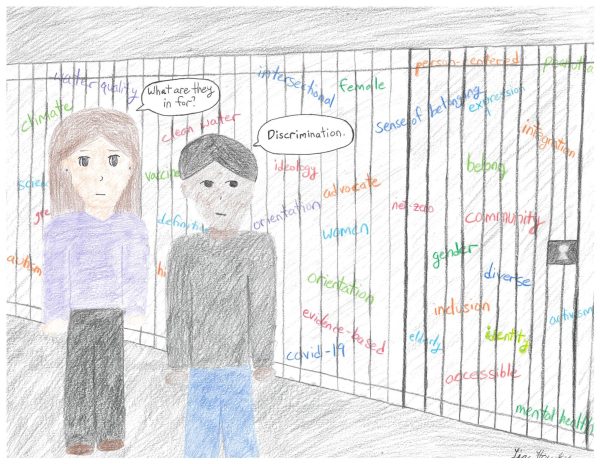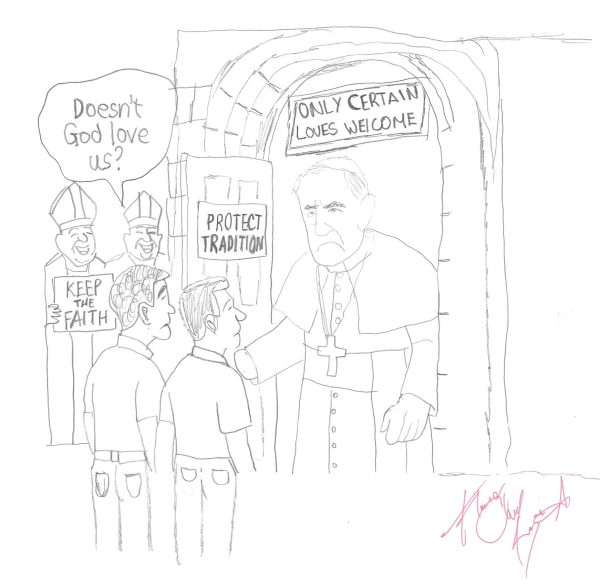The Historical Explanation and Simplification of the President Trump Impeachment Process

Pictured here are baby boomers at a trademark boomer event, WoodstockMusic Festival. (1969 by Ric Manning Woodstock-kids.jpg)
With the majority of the news we’ve heard this school year being about impeachment, it’s clear this is an important topic in the nation’s history. And although there is much talk of Congress statement breakdowns, and quick reviews from a thousand news sources, with how much we have to keep up with our school curriculum, it would be nice to see one piece of media that breaks down the basic necessary information needed in order to keep up with the news. That is the point of this article. To explain how impeachment works, and what happens next in the process.
The main problem facing when writing a simplified article of Impeachment is the necessity of using certain vocabulary that, given the current state of our public schools, we simply do not get taught. This causes people to just get lost in the words, “Impeachment Trial’, and, ”quid Pro quo”. So, to best perform a breakdown of the facts, here how this will work. Next to each politically defined word or phrase needed to report this story, there will be a number next to it like this: Impeachment, and then at the bottom of this article, the definition for it will be provided with the ocoording number. Think of it as a political glossary. One that will hopefully influence the student body conversation, and your interest in current events.
Historical Context
Article 2, Section 4, Clause 5 of the U.S. Constitution states, “The President, Vice President and all Civil Officers of the United States, shall be removed from Office on Impeachment for, And Conviction of, Treason, Bribery, or other High Crimes and Misdemeanors.”
The Impeachment process of a United States of America president has only come in to play three other times in history. Andrew Jhonson, the 17th President, Richard Nixon the 37th President, and Bill Clinton the 42nd President. No president has ever been removed from Office. Although it’s too early in the process to say how this event will differ from the others, the others are but a hand full.
In April of 2014, the U.S. Vice President of the time, Joe Binden, lead a delegation towards Ukraine’s capital to offer financial aid towards the ongoing war between Russia and Ukraine. A month later, The son of Joe Biden, Hunter Biden, joined Burisma, a major Ukrainian oil and gas company. At the time, journalists questions if the actions of Vice President in Ukraine were a conflict of interest.
Fast forward to July 25th of 2019. President Trump congratulates the recently inaugurated President of Ukraine, Volodymy Zelensky, over the phone. The discussion turned to the subject of Biden’s involvement, and theorized corrupted motives, in the Ukrainian Russian war when serving as the Vice President. The transcript of said call can be found in NBC’s news article “Read Trump’s phone call with Ukraine president: Full text” report. The transcript can also be found with a single google search. According the the NBC transcript, President Trump states this to President Zelensky: “I would like you to do us a favor though because our country has been through a lot and Ukraine knows a lot about it. I would like you to find out what happened with this whole situation Ukraine…there’s a lot of talk about Biden’s son…That Biden stopped the persecution and a lot of people want to find out about that so whatever you can do with the Attorney General would be great”. This attorney general having been involved with Biden’s actions in 2014. The main controversial significance of this quote is that at the same time this “favor” was asked, President Trump made the decision to withhold 291 million dollars in military aid from going to Ukraine for the same war between Russia and Ukraine Biden had dealt with in his Vice Presidency. This is what caused a whistleblower to go to Congress with complaints of President Trump’s motives, believing this to be a strategic act by the President to get a better chance in beating his now running mate Joe Biden in the 2020 election.
After this reaching Congress, on September 24th, Nancy Pelosi, the Speaker of the U.S. House of Representatives, announced the House of Representatives will be moving forward with an official Impeachment inquiry. The Democratic side of The House of Representatives argue that President Trump has performed an act that qualifies as one of the three things worthy of Impeachment, previously stated. The Republican side argues that there is no real evidence to justify an act of Impeachment.
The Process So Far
As of writing this article (Nov 26th, 2019) the Impeachment Process is still in it’s inquiry phase. The last two weeks have been the most hectic in the the news reports as it’s going to be in this process. The decision between what has happened and what will happen is mostly up to three parties from Congress; The Intelligence Committee, The Judiciary Committee, and the Senate. All of which are part of the House of Representatives. The Intelligence Committee’s responsibility is to find evidence that would invoke Impeaching the President according to the constitution. In an effort to do this, the Intelligence Community has called a number of second hand and first hand witnesses from the call between President Trump of President Zelensky’s phone call. These witnesses answer a series of questions about their experience of the event to the Intelligence committee, and are private from the media. Transcripts of these closed door hearings, often called depositions, have now been released to the public. These past two weeks of political news have mostly consisted of broadcasting the 12 public testimonies done in addition. These testimonies were put in front of the camera, not to give the American people the full understanding of the exact timeline that lead to the call, but more so to remind people that this is happening. In others words, you do not need to understand, or even watch, the dozens of hours worth of testimonies to keep up with the Impeachment process. The testimonies are really more for Congress then for the American people.
The Process Yet To Come
As stated before, the testimonies are to help gather evidence to use as reasons to impeach the president. Although they could still call more witnesses now, Two things can happen from their. One, the Intelligence committee decides there is not enough evidence to support claims to Impeach the President, or two, the Intelligence community finds there is enough evidence and writes a report of their findings to claim the Impeachment. That report will then go to the Judiciary Committee for evaluation. It is the Judiciary Committee’s responsibility to Craft any articles of Impeachment they can from the findings in the Intelligence Committee’s report. The Judiciary Committee could also call witnesses to testify at this time if they chose. After the articles of impeachment are crafted, it would be brought to the House of Representatives as a whole for debate, eventually leading to a vote towards or against said Articles, which would need to be 51 percent or more to Impeach (President Nixon resigned before this vote could take place). The Full House of Representatives is made up of 435 members; 197 Republicans, 233 Democrats, 1 Independant and 4 Vacancies. If the vote it half or more against, the inquiry is abandoned. If the vote is half or more for, the President is then Impeached.
This does not mean President Trump is no longer President, though. This Process would now become an Impeachment Trial. Certain members of the House committee who are for Impeachment (the Democrats) are then chosen to be what is called Impeachment managers. In an Impeachment trial, Impeachments managers would play to role as Prosecutors, and would bring the official Articles of Impeachment to the Senate. It is then the Senate’s responsibility to play the role of Jurors in this Trial. The Republican side of the House would also choose Impeachment managers to, in this case, fight for the defence of President Trump. This trial would end with a Vote by the senate that would need two-thirds at least (67%) in order to convict President Trump. If the vote does not reach two-thirds, the President is acquitted and remains in office (this is what happened with President Johnson and President Clinton). If the vote does reach two-thirds or over, the President is convicted, and then soon removed from office. Of the 100 Senators of congress (2 for each state), 53 are Republicans, 45 are Democrats and 2 are independants. The Vice President, Mike Pence, would then be sworn into office and become the serving President of the United States.





